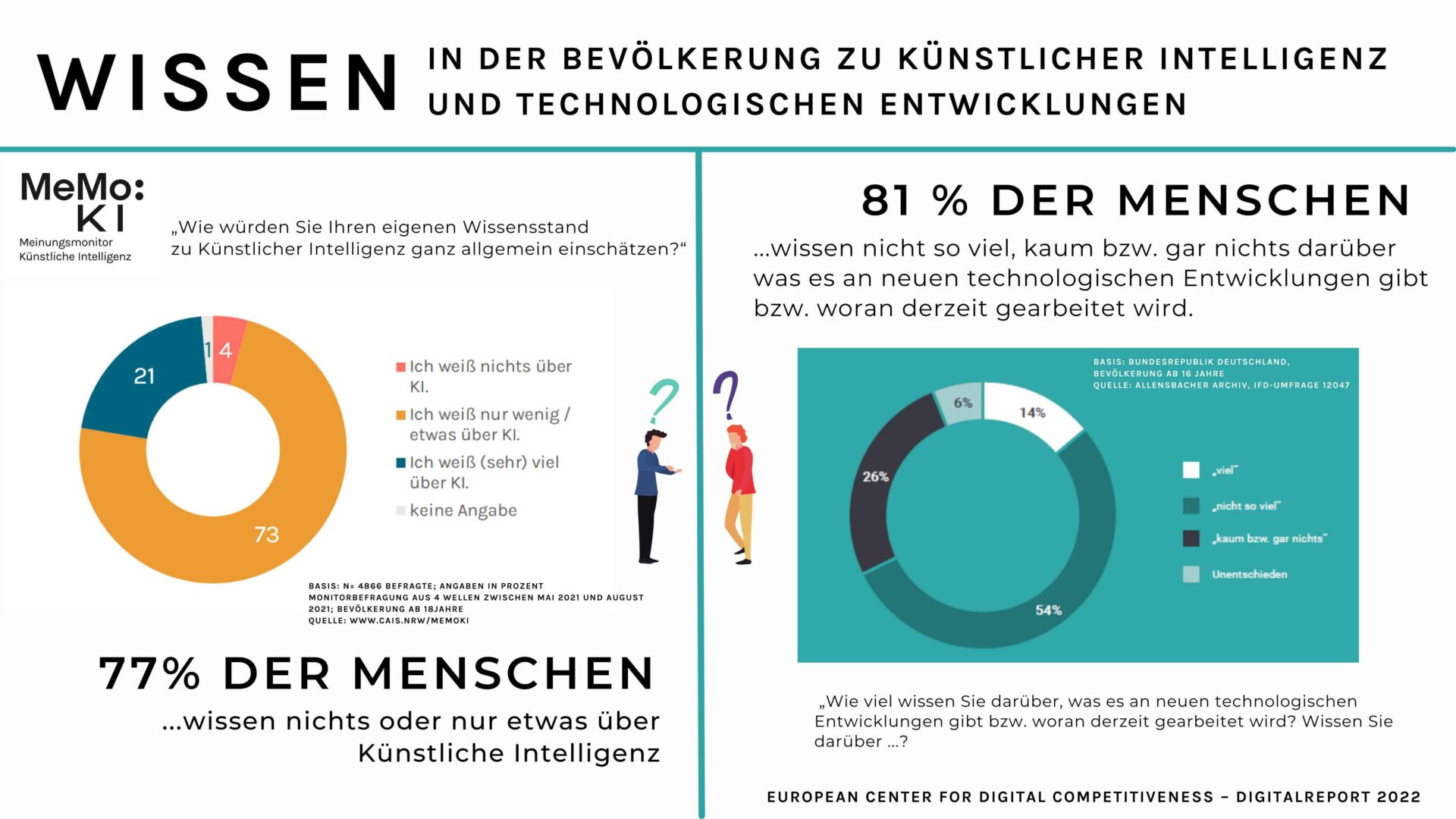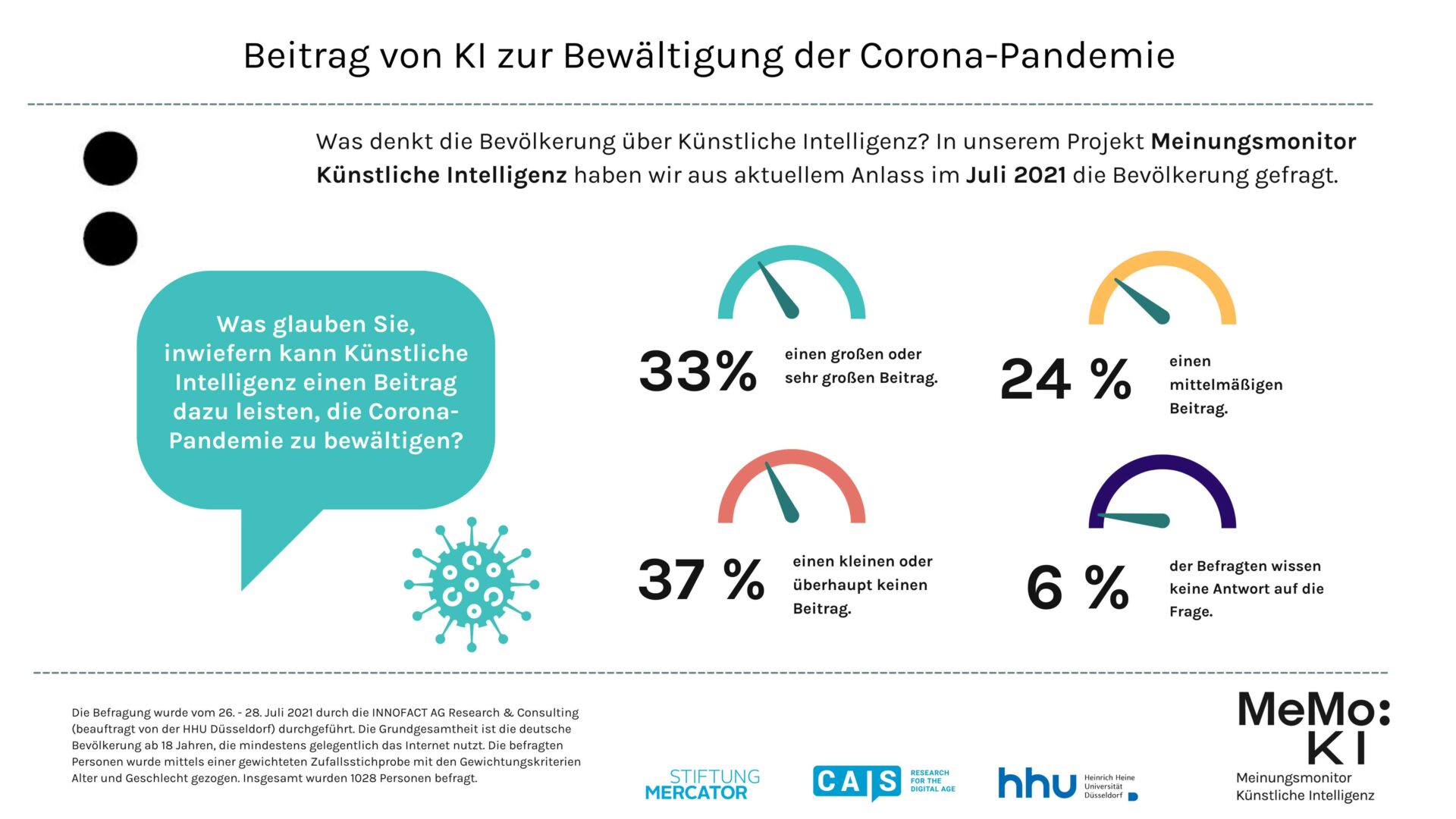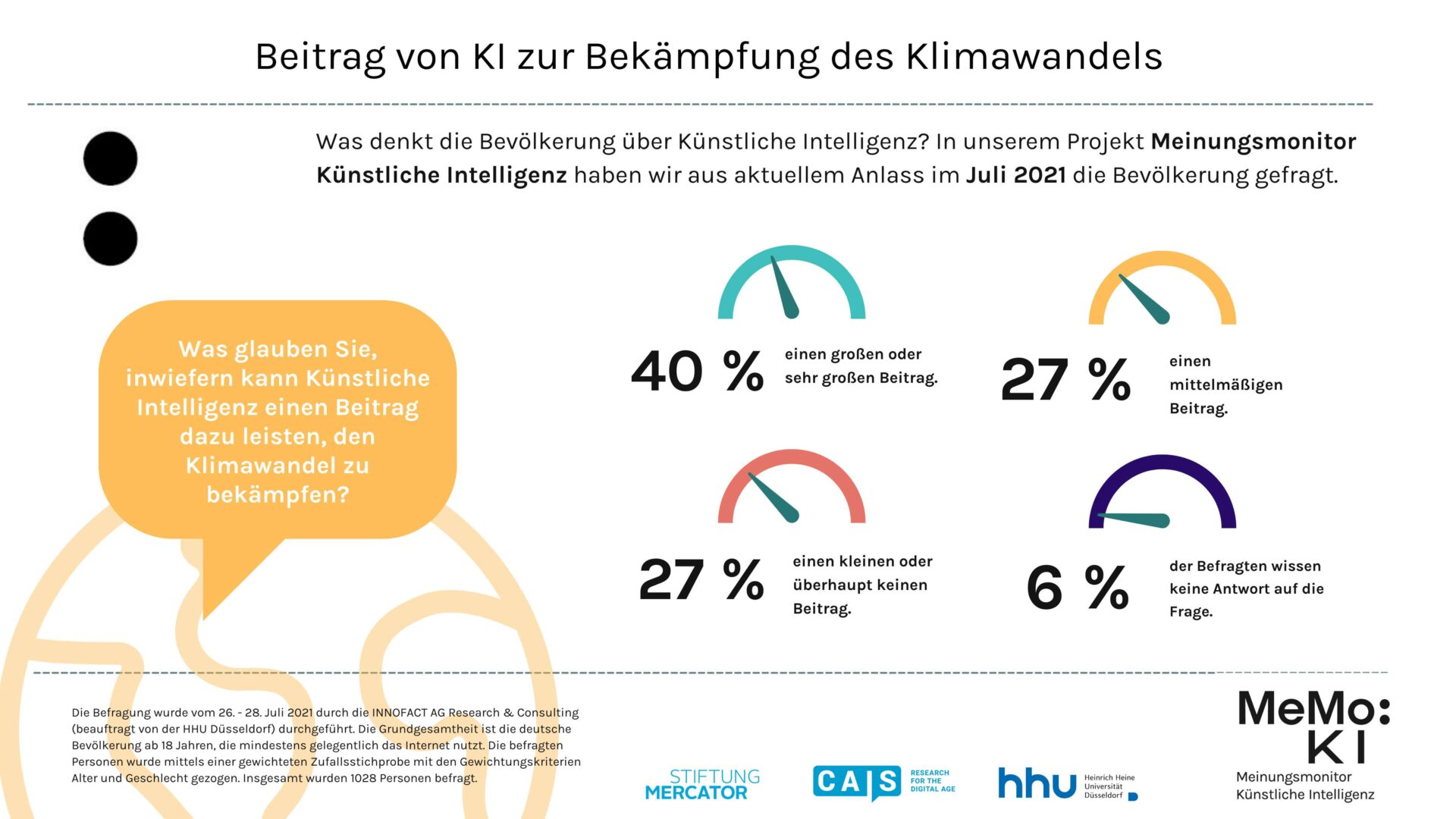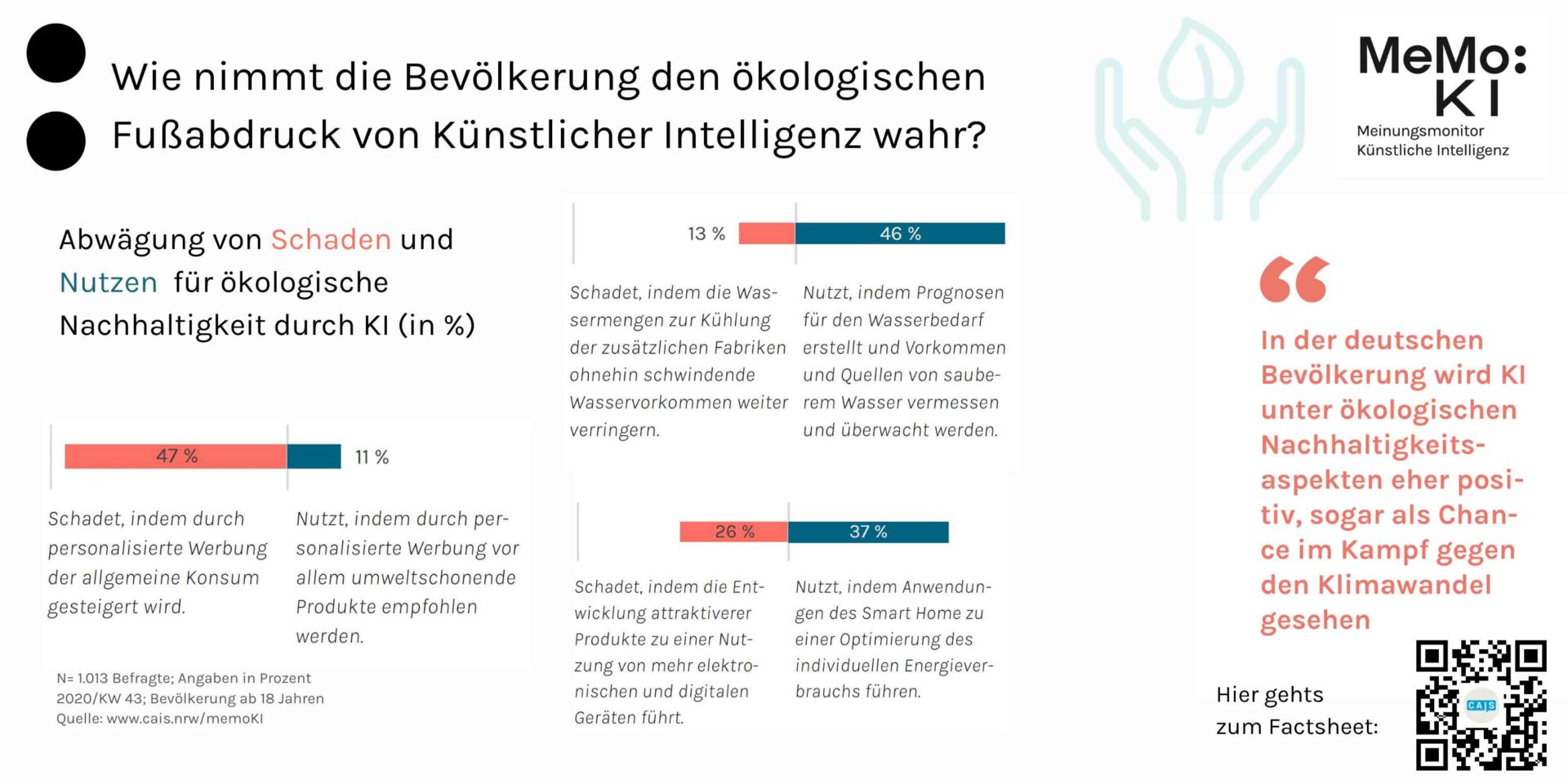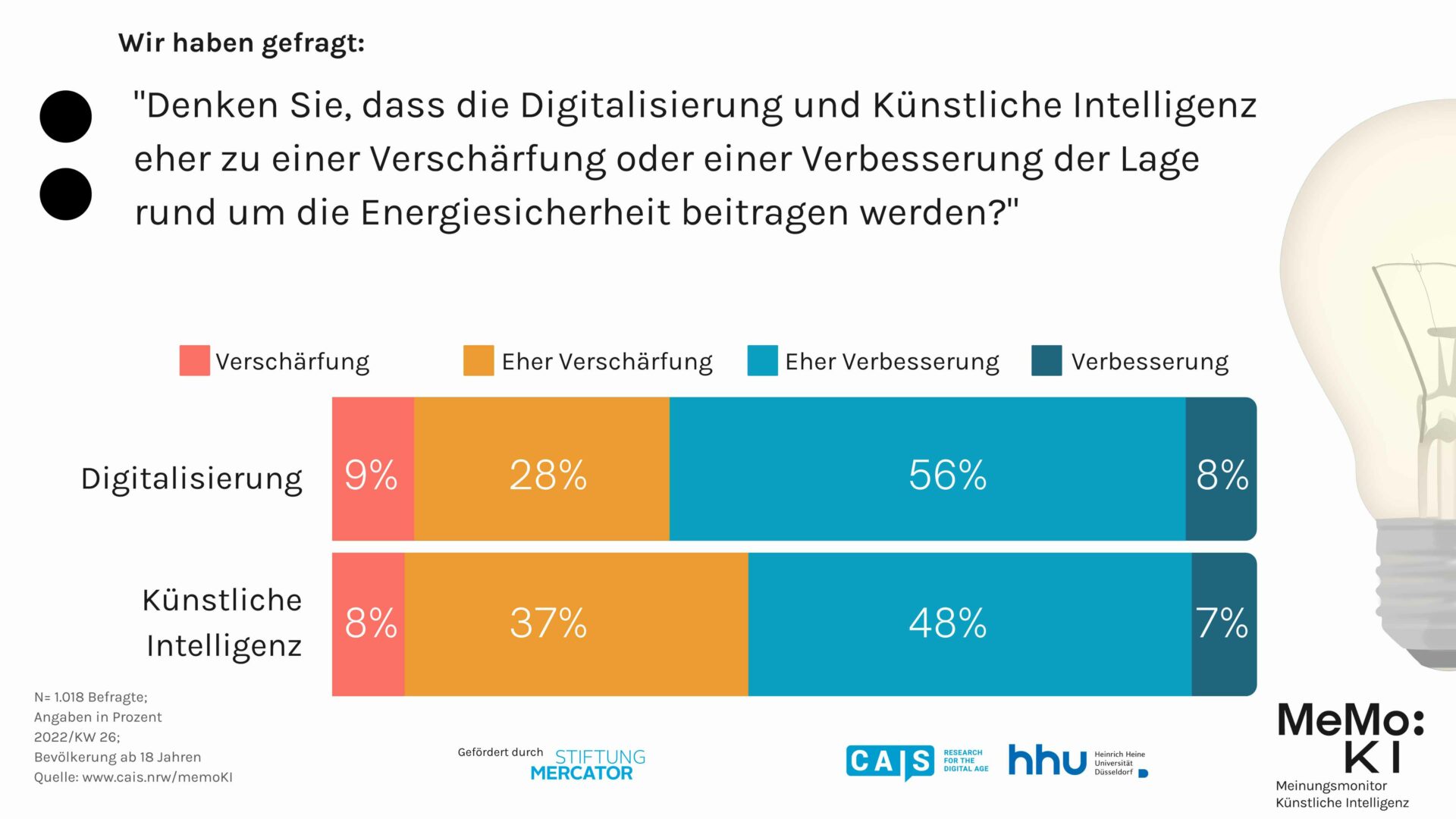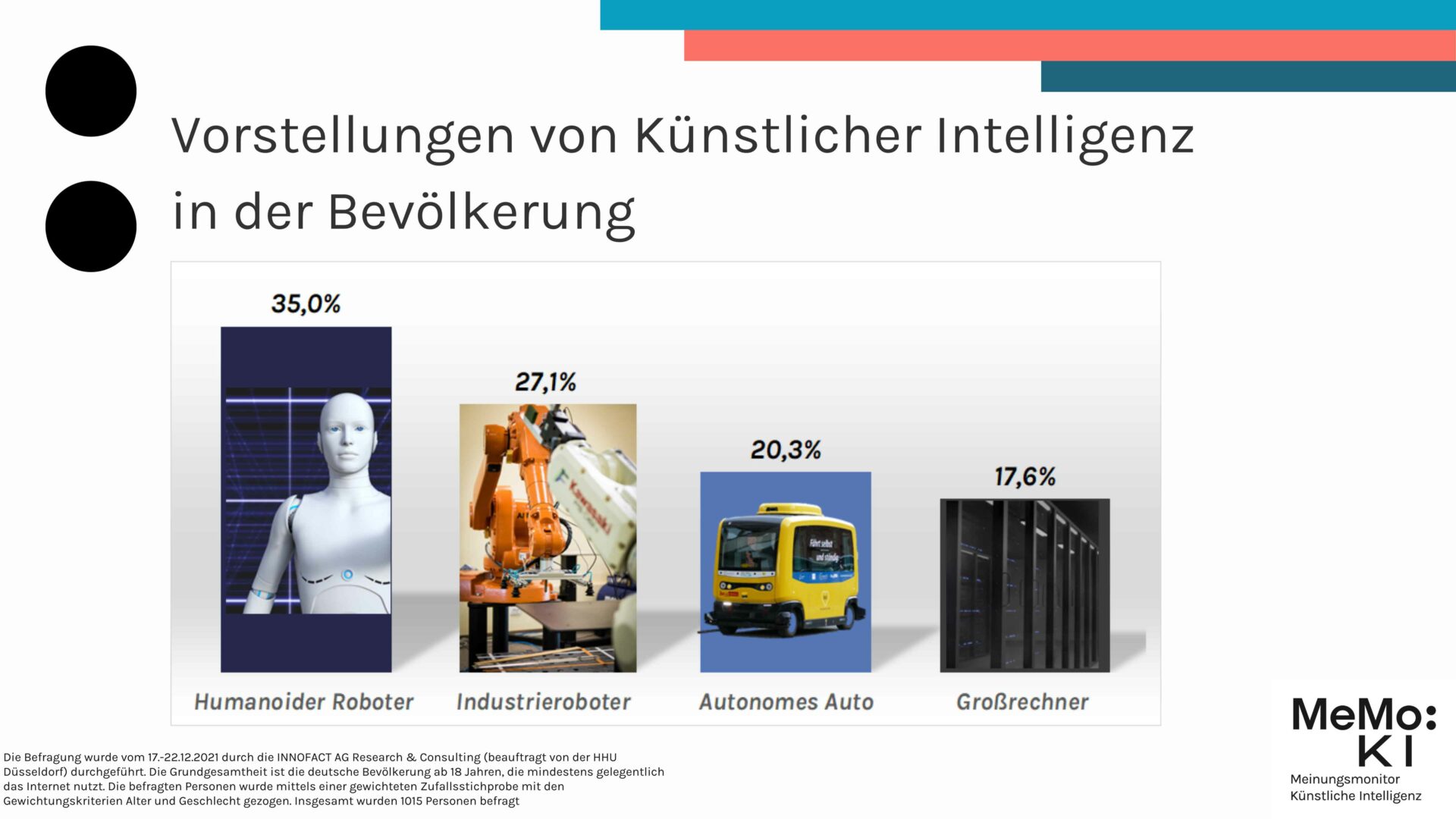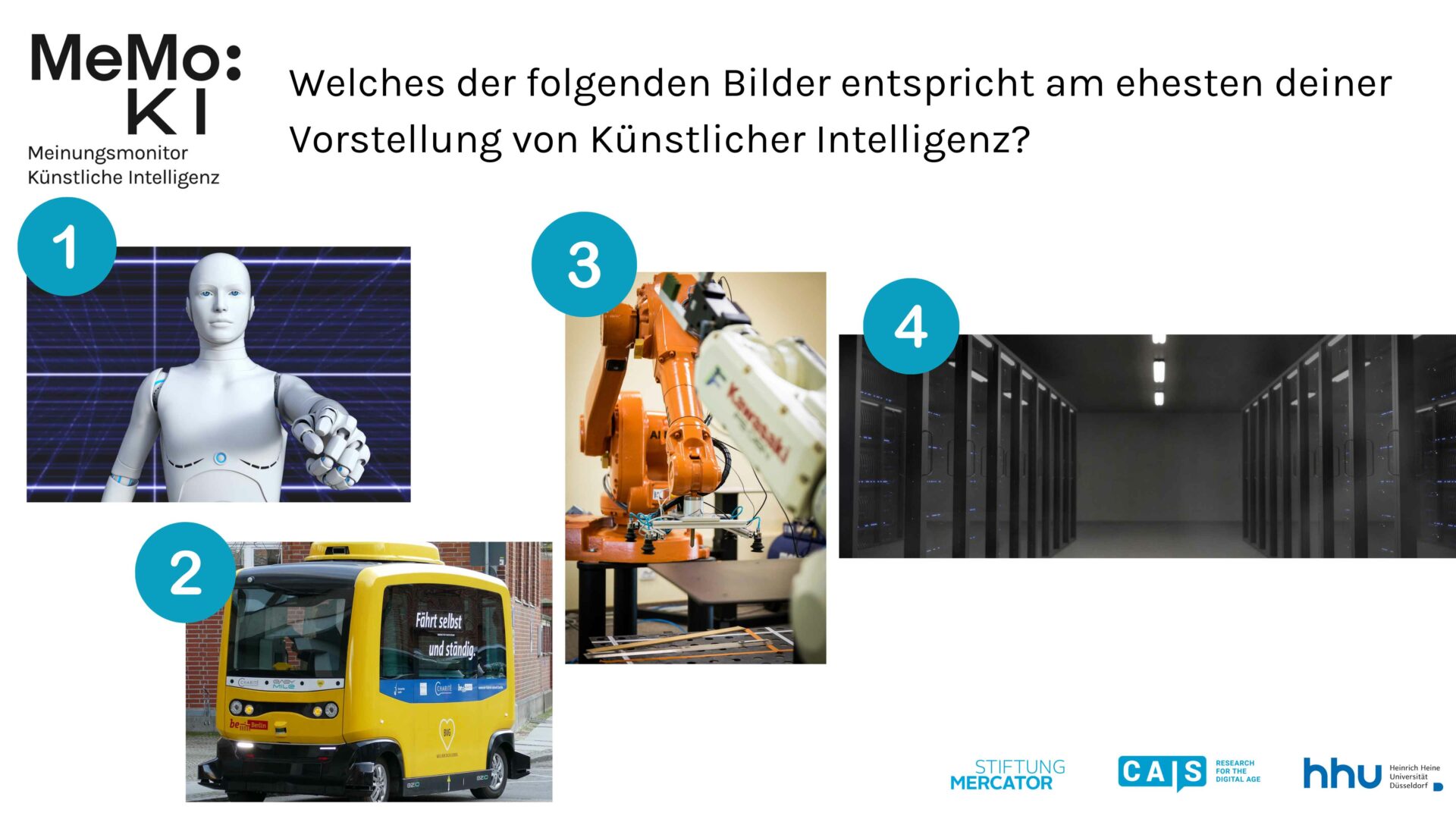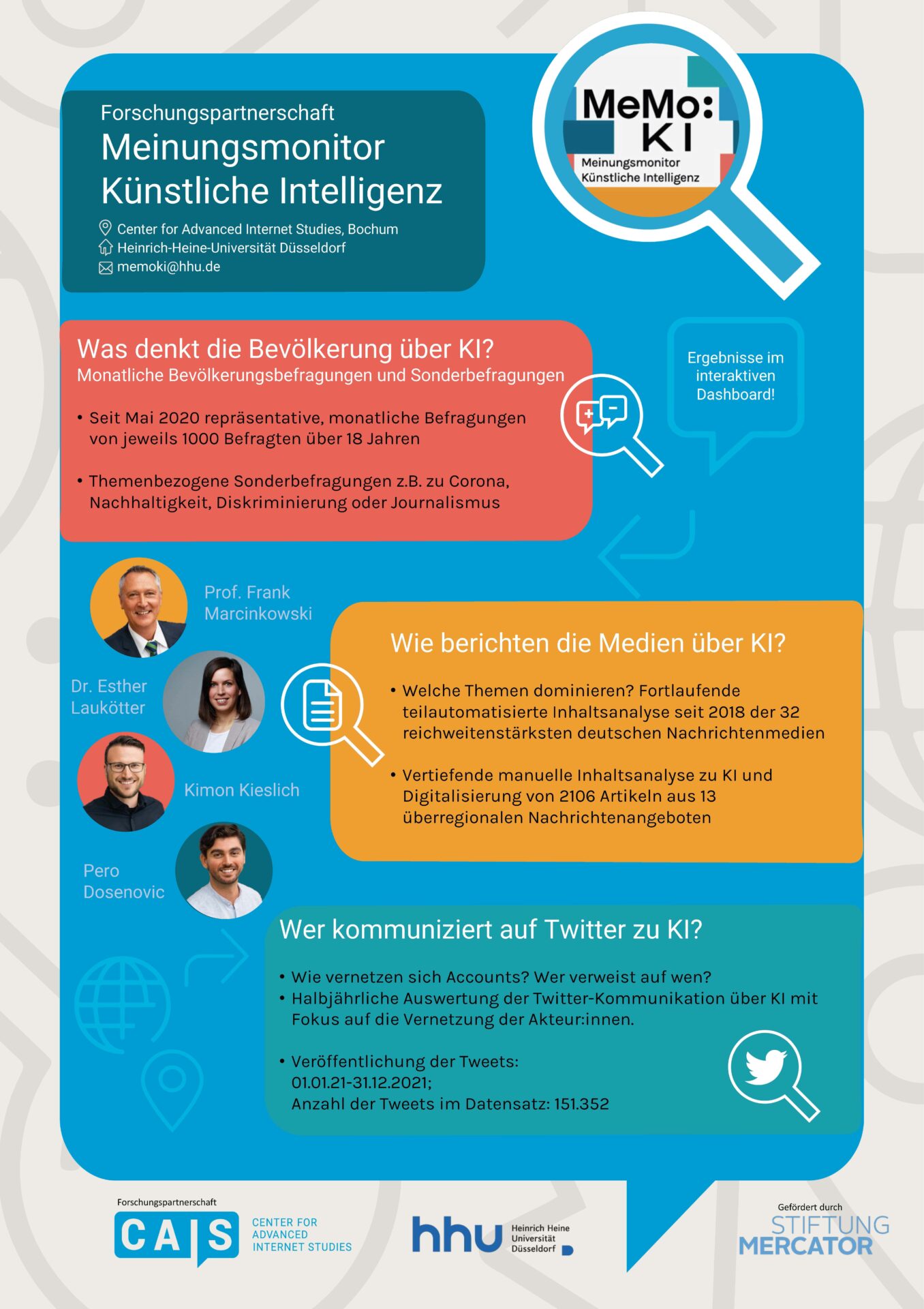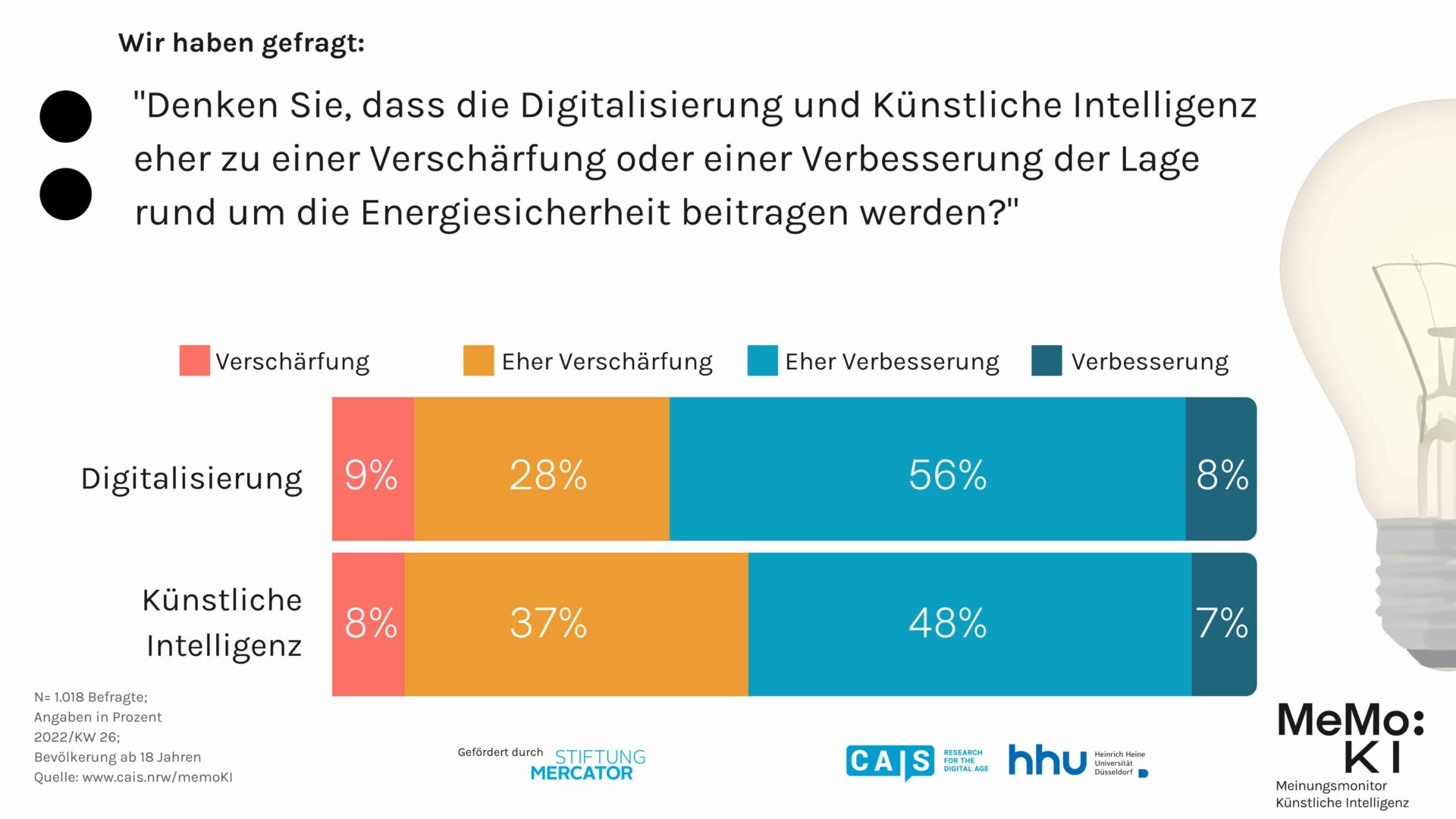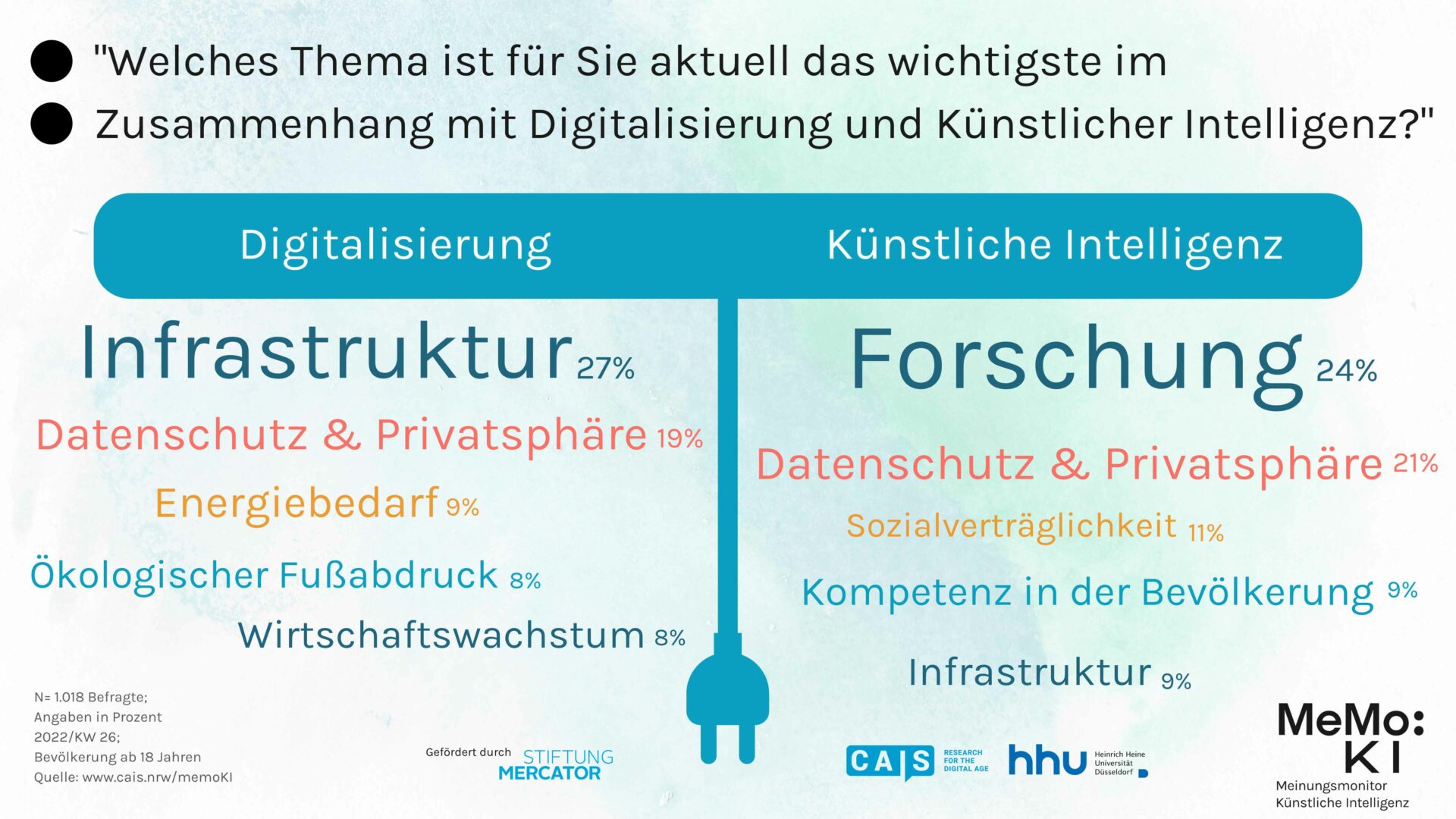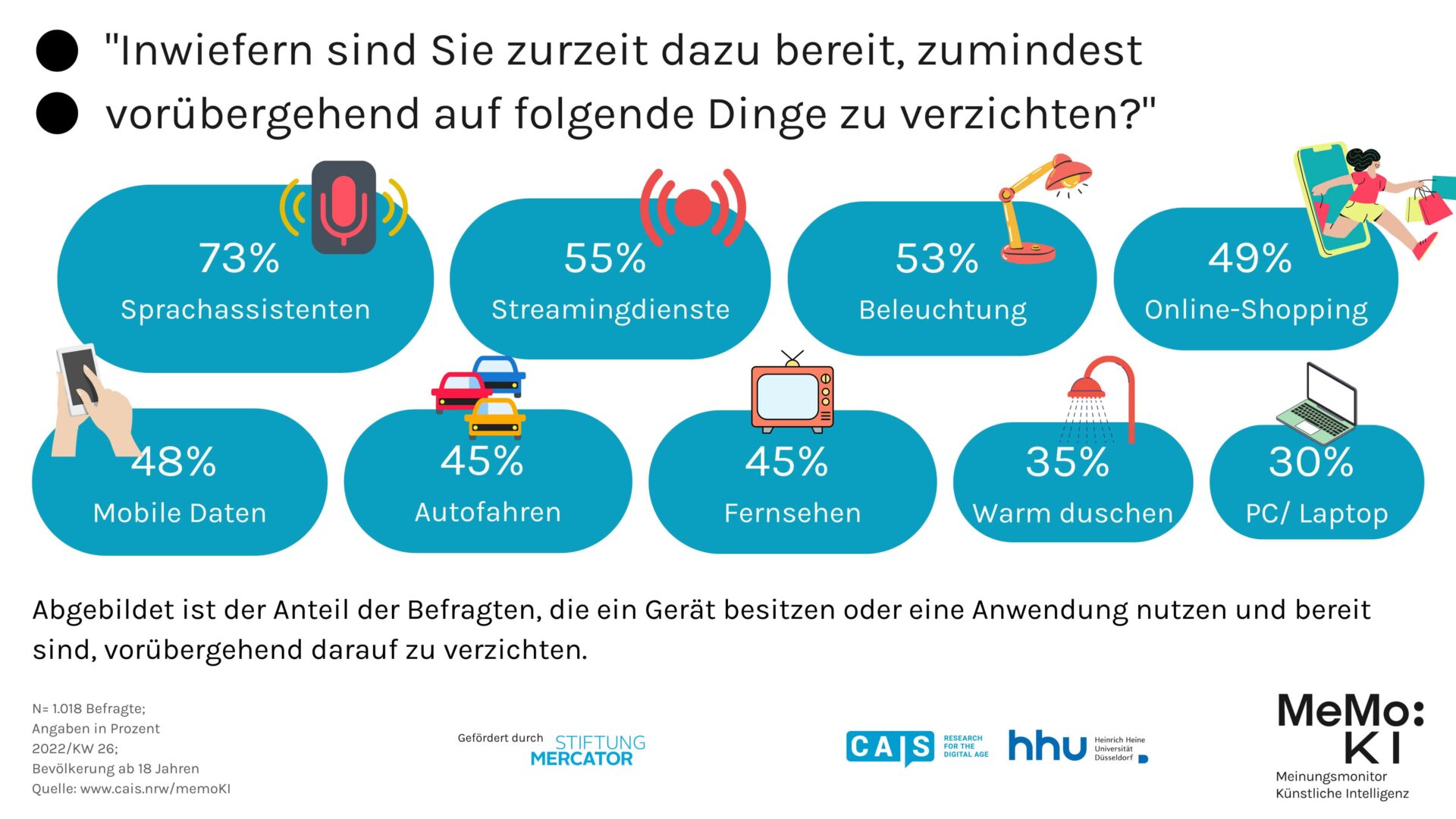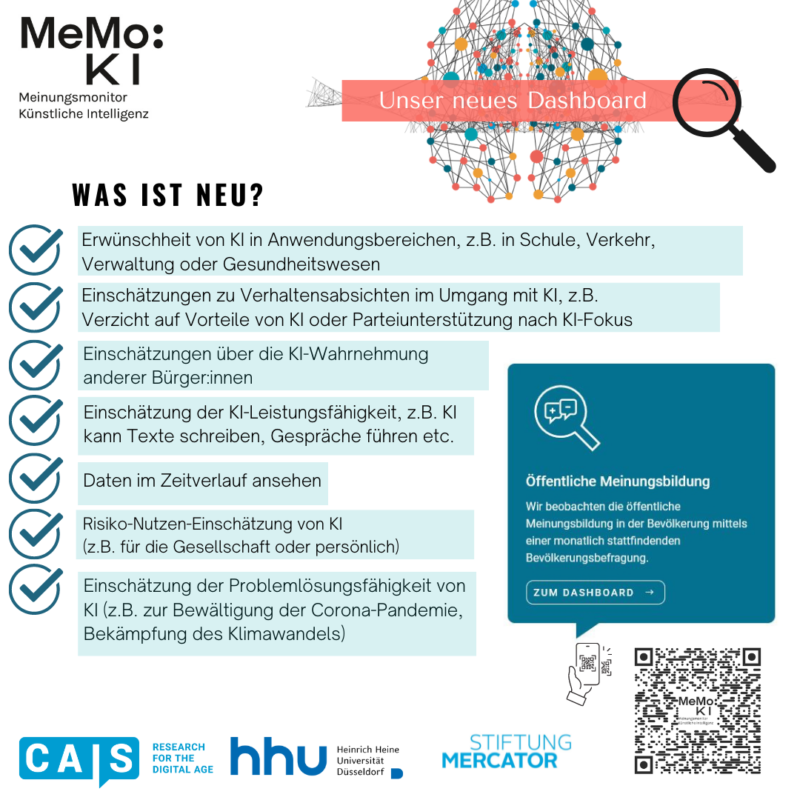MeMo:KI – Opinion Monitor Artificial Intelligence
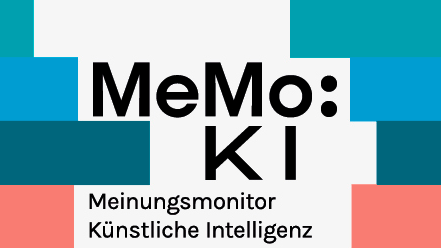

The project “Meinungsmonitor Künstliche Intelligenz” (MeMo:KI) permanently and reliably monitors the public discourse on artificial intelligence via monthly population surveys, analyses of media coverage as well as communication about AI on Twitter.
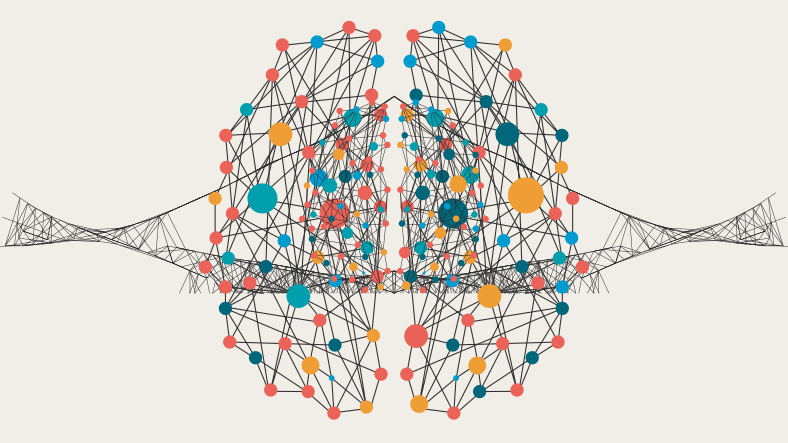
What does the public think about artificial intelligence?
How does the media report on AI?
Are people more in favor of or against the use of artificial intelligence? Does an economic perspective dominate media coverage of AI or are ethical issues discussed above all? How does the public view the use of AI applications in the fight against the Corona pandemic? Who tweets most frequently about AI?
read more
These and many other questions have been asked frequently in recent years.
Findings on attitudes toward AI are by no means uniform: According to Bitkom (2021), there is a rather positive basic attitude toward AI technologies among the population. The figures indicate that AI is perceived exclusively or mostly as an opportunity by almost three quarters of those surveyed. Only 13 percent of Germans perceive AI as a threat. The Eurobarometer (2020) shows that for around half of those surveyed (51%), measures are required on the part of policymakers to ensure an ethical approach to AI. A large majority (80%) of respondents want to be informed about whether a digital service or mobile application uses AI in different situations. Elsewhere, however, there is a greater emphasis on risk assessments. YouGov points to a more negative perception of AI in Western countries. Here, risk perceptions differ between specific application fields (YouGov, 2021). Recently, the Bertelsmann Foundation reported a large knowledge gap in Germany, according to which large parts of the population assume that they have only limited knowledge about algorithms and AI, and that they can hardly assess the consequences of their use (Bertelsmann Foundation, 2022).
In order to shape technology in a way that is compatible with democracy, however, decision-makers should be aware of the ideas of the population and (civil) society. Why? There are two answers to this: First, people in decision-making positions tend to strengthen their own position by drawing on a personal impression of “public opinion”. This can have far-reaching consequences for the use and design of AI, for example when public money is spent on the promotion of AI research or further education for citizens on the basis of a feeling. Our project MeMo:KI provides a reliable database as a counter-design to anecdotal knowledge.
In addition to the population survey, this also includes an analysis of media coverage on the topic of AI. For the 32 print and online media with the highest coverage, monthly reports are made on which top topics are most strongly included in media coverage. In the past, it has been shown that the thematic focus in media coverage is primarily on economic efficiency gains through AI. Reports on opportunities for economic progress predominate, while risks are mentioned less (Fischer & Puschmann, 2021).
In various papers from country to EU level, institutions also claim human-centered AI development that complies with ethical principles and label this as a unique selling point of AI “made in Europe”. However, such a framework is not a foregone conclusion. Democratic and social compatibility is not ensured by political institutions writing it into position papers. If policymakers take their own demands seriously, they depend on the support of an active and enlightened (civil) society that can contribute ideas to the shaping of digitization policy and, above all, demand their implementation. Otherwise, the development as well as implementation of AI technologies will remain the preserve of interested industry, whose primary goal is to maximize profits and increase efficiency. In a long-term study of public and published opinion, MeMo:KI therefore investigates the extent to which the conditions for opinion formation on the topic of AI in the population are given and how these conditions change over time.
Theoretical background
Methods-
combination
Goals
of the MeMo:KI
Who communicates about AI on Twitter?
About the project
Researchpartner:
Heinrich-Heine-Universität Düsseldorf
Since 01.04.2021, the project has been funded by Stiftung Mercator.
From 01.01.2020 – 31.03.2021 the project was funded by the Ministeriums für Kultur und Wissenschaft des Landes NRW.
Method profile
Go to …
Research results
Latest
New Factsheet “AI & Energy Security
What does the German public think about the use of artificial intelligence in the energy sector?
Art generates AI generates art
How does the dual role of artificial intelligence – as an art object and as an art producer – shape public opinion about the technology?
ChatGPT, how many people already know you?
Current study shows that the new chatbot is known to almost 30 percent of the German population.
Spotlight: Artificial intelligence and sustainability – What does the German population think?
Project leader Prof. Frank Marcinkowski presents new project results at the KI.Forum NRW: How is the connection between AI and sustainability perceived by the German...
New dashboard: Find out what the public thinks about artificial intelligence
Do you think artificial intelligence should make decisions for humans? How much do you know about AI or have you heard anything about it in...
MeMo:KI at KI.Forum.NRW 2022 on the topic of AI and sustainability
Prof. Frank Marcinkowski gives an insight into how people perceive the connection between AI and environmental sustainability
Science Night in Düsseldorf (09.09.2022)
Visit the joint stand of MeMo:KI and DIID at the Night of Science.
MeMo:AI at Workshop on AI, Bias and Disinformation
The team of the MeMo:KI project discusses science journalism and AI in a breakout session.
MeMo:KI on AI and discrimination in the #InsideHeiCAD podcast
What does the German population think about discriminatory AI? Opinion Monitor provides data for podcast episode.
Twitter as a new data basis for researching public opinion
The project Opinion monitoring Artificial Intelligence [MeMo:KI] publishes network analyses on communication about artificial intelligence (AI) on Twitter for the year 2021.
Factsheets
Within the framework of special surveys, we delve into specific questions in the project and elaborate them (also in cooperation with civil society institutions) in factsheets.
AI & Values
Do people’s long-term values influence their attitudes towards AI? Do these values influence the use of AI applications such as ChatGPT?
Long-term values significantly shape the decision-making and behaviour of individuals. Whether and how specific values influence the acceptance of AI and the willingness to use AI applications such as ChatGPT is addressed by the Opinion Monitor Artificial Intelligence [MeMo:KI] in a recent survey.
AI & ChatGPT
How known is ChatGPT in the German population and how is it perceived?
In a survey conducted by Meinungsmonitor Künstliche Intelligenz [MeMo:KI] in January and March 2023, the German population was asked about their knowledge, use and evaluation of the AI language model.
AI & Energy Safety
What does the German population think about the use of artificial intelligence in the energy sector?
In a recent survey, the Artificial Intelligence Opinion Monitor [MeMo:KI] analysed the areas of application in which the population would like to see AI systems and whether the perception of the energy crisis is influencing this acceptance.
Art generates AI generates art
What does the German population think about the use of artificial intelligence in art?
In a recent survey by the Meinungsmonitor Künstliche Intelligenz [MeMo:KI], the German population was asked about their perception of the topic of artificial intelligence in the field of art.
Media coverage of artificial intelligence
A Topic Analysis of German Media Coverage on Artificial Intelligence.
German media coverage of AI breaks down into 25 topics. While these are broad, an economic perspective on AI dominates. The thematic focus differs between media genres. In addition, the reporting is strongly occasion-driven.
Sustainability and Artificial Intelligence
How does the public perceive the environmental footprint of AI?
AI tends to be seen as a solution to the problem. Overall, the figures indicate widespread ignorance of the connection between AI and ecological sustainability. Compliance with ecological goals is understood as a task for society as a whole.
Algorithmic recommender systems
What does the public think about the use of algorithmic recommender systems?
Algorithmic recommender systems are perceived as useful in many areas of application. However, 67 percent of those surveyed consider algorithmic recommender systems to be not at all trustworthy or only slightly trustworthy. The respondents are very critical about the use of personal data.
Artificial intelligence in journalism
How does the public perceive the influence of AI on the future of journalism?
The use of AI in journalistic newsrooms is viewed very critically. Hardly any improvement in journalistic quality is assumed. Many citizens are in favor of strong regulation of AI in journalism. Despite the critical judgment, citizens expect AI to be able to perform some journalistic tasks better than journalists.
Artificial intelligence in the world of work
How does the public perceive the influence of AI on the future of the world of work?
AI is seen as having opportunities in terms of occupational health and safety, the requirements for necessary skills and the workload. The handling of data, the maintenance of social contacts, income or opportunities for co-determination at the workplace could suffer from the introduction of AI in the view of the respondents.
Artificial intelligence and discrimination
How does the population perceive a possible risk of discrimination through AI?
Discrimination through AI is generally perceived by the population as only a moderate risk. However, when it comes to negative economic consequences, the use of AI is viewed rather critically. Many citizens would like to see greater regulation of AI.
Artificial intelligence in the fight against the Corona pandemic
What does the German public think about the use of AI to combat the Corona pandemic?
Citizens differentiate between various AI applications. Overall, the approval ratings for most applications are higher than for a general use of AI in healthcare. AI applications with individually attributable and existential consequences, on the other hand, receive lower approval ratings.
Graphic Download
Within the scope of our project, infographics and evaluations are created from time to time. You are welcome to download them free of charge and publish them with a reference to our project. We are happy to receive information about where you publish the elements. You are also welcome to link us on Twitter @_MeMoKI.
Publications
Kieslich, K., Lünich, M., & Došenović, P. (2023). Ever Heard of Ethical AI? Investigating the Salience of Ethical AI Issues among the German Population. International Journal of Human–Computer Interaction, 1–14. https://doi.org/10.1080/10447318.2023.2178612
Presentations
Marcinkowski, F. (2022, Mai). Monitoring Public Opinion on AI. Vortrag im Workshop AI and the Common Sense, Nancy (23.-25.05.2022).
Kieslich, K. (2022, Mai). What Audience to Expect for Science Communication on AI? Vortrag im Theme Development Workshop “AI: Mitigating Bias and Disinformation”, Vision4AI (18.05.2022).
Lünich, M., Weinmann, C., Došenović, P. & Kieslich, K. (2022, Februar). KI in der politischen Kommunikationsforschung: Theoretische Perspektiven und empirsche Fragen. Workshop im Rahmen der 67. Jahrestagung der Deutschen Gesellschaft für Publizistik und Kommunikationswissenschaft (22.-24.02.2022).
Marcinkowski, F. (2021, Oktober). Der Mensch im Zentrum Lernender Systeme! Weiß er das? Vortrag im Rahmen KIT Science Week – ZAK Talks, Karlsruhe (9.-10.10.2021). Mitschnitt verfügbar unter https://www.youtube.com/watch?v=NMiKvnVWpWI&list=PL0TmH52ybqIfPZCosPxt5PVz88I_Yf5Fd&index=8&t=771s
Kieslich, K., Došenović, P., Marcinkowski, F., & Keller, B. (2021, September). Artificial Intelligence: A promising future or a serious threat? An investigation into media coverage and public perceptions of AI in Germany. Präsentation in der Audience and Receptions Studies Section auf ECREA´S 8. European Communication Konferenz in Braga (07.-09.09. 2021).
Došenović, P. (2021, Mai). Die Beobachtung von KI in Arbeit und Gesellschaft. Mit welchen Indikatoren können wir die Verbreitung und die Effekte von KI messen und analysieren? Welche gibt es und welche brauchen wir noch? Podiumsdiskussion im Rahmen der Konferenz “Algorithmen, Automatisierung und Arbeit – Wie KI unsere Arbeit und unser Leben besser machen kann.” der Denkfabrik Digitale Arbeitsgesellschaft, Berlin (19. – 20.05.2021)
Kieslich, K. & Došenović, P. (2021, Januar). Human-centered or economically driven? Monitoring public opinion on AI in Germany. Gastvortrag im London PUS Seminar, London (27.01.2021).
Bibliography and sources
Bertelsmann-Stiftung. (2022, 29. April). Mehr Wissen, aber wenig Orientierung: Wie sich das Verhältnis Deutschlands zu Algorithmen und KI entwickelt hat. Algorithmenethik. Verfügbar unter https://algorithmenethik.de/2022/04/27/mehr-wissen-aber-wenig-orientierung-wie-sich-das-verhaeltnis-deutschlands-zu-algorithmen-und-ki-entwickelt-hat/
Bitkom e.V. (2021, 10. Dezember). Fast drei Viertel sehen Künstliche Intelligenz als Chance. Bitkom. Verfügbar unter https://www.bitkom.org/Presse/Presseinformation/Kuenstliche-Intelligenz-als-Chance
de Wilde, P. (2011). No Polity for Old Politics? A Framework for Analyzing the Politicization of European Integration. Journal of European Integration, 33 (5), 559-575.
Eurobarometer. (2020, 5. März). Gestaltung der digitalen Zukunft Europas: Eurobarometer-Umfrage zeigt Unterstützung für Nachhaltigkeit und Datenaustausch. Europäische Kommission. Verfügbar unter https://ec.europa.eu/commission/presscorner/detail/de/IP_20_383
Fischer, S., & Pushman, C. (2021). Wie Deutschland über Algorithmen schreibt. Eine Analyse des Mediendiskurses über Algorithmen und Künstliche Intelligenz (2005-2020). Bertelsmann-Stiftung.
Schattschneider, E.E. (1957). Intensity, Visibility, Direction and Scope. American Political Science Review, 51 (4), 933-942.
YouGov. (2021, 13. Dezember). Künstliche Intelligenz – die deutschen Verbraucher bleiben skeptisch. YouGov. https://yougov.de/news/2021/12/13/kunstliche-intelligenz-die-deutschen-verbraucher-b/
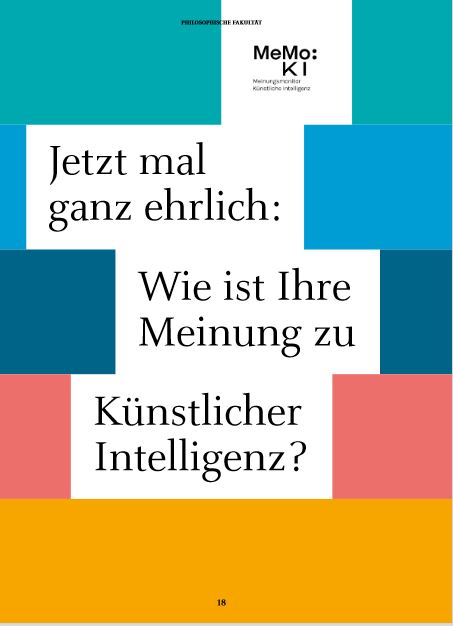
MeMo:KI – Article in the magazine of the Heinrich Heine University Düsseldorf, Issue 3, 2021
The Team







